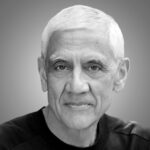Agenda
-
Pale Blue Dot: Applying AI to real industries - optimizing the world
Sometimes the biggest wins aren’t from breakthrough tech, but from simple, practical apps that connect people in the physical world. This session will talk through how replacing clunky internal processes and tools with streamlined solutions can unlock more efficient and cost-effective outcomes in industries that have long been stuck with the status quo.
-
SOSV: Who Buys the Future? Exits in Climate Tech
Even from the earliest stages of a startup’s development, it’s important for founders to keep possible exits in view and to prepare accordingly. SOSV’s resident exit expert, general partner Cyril Ebersweiler, will present a 30-minute primer on exits specific to climate tech followed by 30 minutes of audience Q&A.
-
Airminers: The State of Carbon Removal
Join AirMiners for a conversation with three breakthrough carbon removal startups from Launchpad’s latest cohort – Pure Hawa, CLARGREE and Vaultterra – to get firsthand insights on where the carbon removal sector is headed and what’s working on the ground today — from emerging technologies to shifting market dynamics
-
Khosla: Global Challenges and Successes in FOAK Funding & Scaling in Climatech
Climate tech startups face some of the toughest funding hurdles, especially when building “first-of-a-kind” projects and scaling breakthrough technologies. In this session, Rajesh Swaminathan, partner at Khosla Ventures, will dive into how three pioneering founders have addressed these challenges: LanzaTech (carbon recycling, $1.3B in total funding), Fortera (low-carbon cement, $175.5M in total funding) and Mazama Energy (geothermal, $20M in total funding).
-
Activate: Commercializing the Difficult: Lessons from Carbon Tech Founders
What does it take to commercialize technology that the world once thought impossible? As co-founder of Twelve and Interim Managing Director of Activate NY, Etosha Cave has seen firsthand how climate founders turn cutting-edge science into scalable businesses. This breakout will unpack real-world lessons from carbon tech: aligning science and markets, building credibility with investors, and seizing opportunities where climate urgency meets global demand.
-
TDK Ventures: The Journey of an Electron – Deep Tech Opportunities in a Dynamic Energy Landscape
As the world races toward net zero, electrons are at the center of the transition—how they’re generated, stored, utilized, and optimized will define the future of energy. This panel, hosted by TDK Ventures, will explore cutting-edge innovations across the energy landscape through the lens of deep tech, showcasing breakthrough companies and technologies that are redefining what’s possible.
The conversation will follow “the journey of an electron,” tracing its path from generation to utilization and beyond. TDK Ventures’ global investment team will share insights on emerging trends, spotlighting promising startups and iconic entrepreneurs building the next generation of energy leaders.
This dynamic session will deliver a holistic view of where electrons can take us, from powering sustainable industries to reshaping our digital future—offering valuable insights for founders, investors, and policymakers alike.
-
EIP: Why Climate Tech Start-ups Need Techno-Economic Analysis
In this session, EIP’s techno-economic whiz Dr. Melissa Ball will explain the dos and don’ts of techno economic analysis, the power of a simple model, and open the session up for office hours to allow for Q&A. Back by popular demand!
-
- PSTMain Stage
Climate Tech USA 2025: What Just Happened?
Only in America. We swung from an administration ready to pay nearly any price to decarbonize the U.S. industrial base to one that characterizes the vast ambition as a “con job.” The pullback of IRA credits and DoE grants and loans will derail hundreds of climate projects, even though in a precious few categories, like nuclear and geothermal, it’s still full ahead. In the meantime, China is flooding emerging markets with cheap solar and EVs, Europe’s industries are wobbling due in part to costly premiums priced into their renewable grid, and the earth is heating up faster than ever. Who better to explain the moment than Sightline co-founder Kim Zou, former DoE loan office boss Jigar Shah, and founding director of Columbia’s Center on Global Energy Policy, Jason Bordoff.
-
- PSTMain Stage
Vinod Khosla: The Climate OG VC Is Undaunted
Vinod Khosla never walked away from climate, and doubtless never will. The depth and success of Khosla Ventures’ climate portfolio tells you why. He invested in current powerhouses Lanzatech and Mainspring 15+ years ago, and today the firm is a front runner in many new innovators including Koloma, Commonwealth Fusion and Quaise. Khosla never fails to deliver a fresh and unfiltered take on the investing and climate tech scene.
-
- PSTMain Stage
The Contrarians: New Funds in Climate
New climate funds are getting rarer than hen’s teeth. As of August, Pitchbook counted just 17 new funds that had raised a total of $2.1B this year, versus the peak 94 new funds in 2022 and peak $10B raised in 2021. In other words, this must be a great time to invest in climate companies, at least that’s what we are likely to hear from these check writers who have closed climate funds in the past year: Sophie Purdom (Planeteer, $54M), Tove Larsson (Norrsken Fund II, Euro 57M), and John Tough (Energize Ventures Fund III, $430M). We could not agree more.
-
- PSTMain Stage
Form Energy Is Ready to Go Big. How Fast Can It Go?
Mateo Jaramillo’s Form Energy has emerged as the frontrunner in long-duration, grid-scale energy storage thanks to its 100-hour, iron-air battery technology as well as its relentless push to scale. Form has started battery production at its 550,000 sq ft factory in Weirton, West Virginia and last year received a $147 million grant from the U.S. Department of Energy to help finance the world’s largest long duration energy storage (LDES) facility, in Lincoln, Maine, among several other large-scale deployments. Jaramillo has raised $1.4 billion from a who’s who of climate tech investors. We’re eager to hear how he is navigating the shifting sands for renewables and where LDES goes from here.
-
- PSTMain Stage
Can We Teach an Old Electricity Grid New Tricks?
Electricity grids worldwide are straining under the demands of vast new data centers, electrification, and aging infrastructure. This panel brings together technology pioneers whose aim is to modernize and build out grids before they collapse.
Timothy Heidel, co-founder of VEIR, is developing superconducting power lines that carry 5–10× more power than conventional ones. Drew Baglino, founder of Heron Power, drew on his decade at Tesla to pioneer distributed storage and backup systems. Anirudh Reddy, CEO of Ayr Energy, is speeding up the design and manufacture of critical power grid equipment. Can better technology help grids leapfrog out of obsolescence?
-
- PSTMain Stage
The Data Center Energy Race: Google and Microsoft
In 2023, U.S. data centers consumed about 176 TWh of electricity, representing 4.4% of U.S. demand. By 2028, this figure is projected to rise to 6.7%–12%, equivalent to the power draw of dozens of nuclear plants. Hyperscalers such as Microsoft and Google are already investing in multi-gigawatt campuses, exploring on-site generation from wind, solar, gas, nuclear, and geothermal, while racing to scale advanced cooling and energy storage. How will Big Tech balance soaring demand with its climate commitments? Microsoft’s Sean James, Sr Director Energy & Data Center Research, and Google’s Lucia Tian, Head of Advanced Energy Technologies, will walk us through how they’re working to secure the energy they need, including partnering with startups on the grid.
-
- PSTMain Stage
The Geothermal Moment: Lung Fractures and Super Hot Rock
One source of renewable energy that the Trump administration seems to favor is geothermal, perhaps because the US firms have a distinct lead at this early stage. Turning sub-surface heat into energy is not new, but the latest technologies, often derivatives of advanced oil & gas drilling technology, are making it more economical and less dependent on volcanic geographies. Quaise aims to drill up to 12 miles into the earth’s crust to find super hot (>705 degrees F) rock, whereas Sage drills at conventional depths to create “lung” fractures that both store energy for LDES and to provide heat for power generation. Founders Carlos Araque and Cindy Taff will go deep, so to speak.
-
- PSTMain Stage
Nuclear Fission Re-Fueled: Putting Nuclear Back on the Map
As of 2024, about 440 reactors globally provided 2667 TWh, about 9% of the world’s electricity. For decades, nuclear stagnated in the West, but now thanks to bipartisan support in the US and private capital flowing, nuclear energy is making a comeback in the US and abroad as a source of clean, reliable power. Venture firms like Nucleation Capital are backing a new wave of innovators, while startups such as Aalo Atomics are developing modular, factory-built reactors for data centers and cities. Our panelists will discuss how modern fission can be redesigned for this new electric age, and what it will take to scale safely, swiftly, and affordably.
-
- PSTMain Stage
Mainspring Energy: The Linear Generator Moment
Founded fifteen years ago as a Stanford spintout, Mainspring has raised $850 million to commercialize a linear generator that produces no emissions, burns almost any gaseous fuel, including natural gas, ammonia, and H2, and can switch easily from one fuel source to another. Those features and a welcome ITC extension for linear generators in the OBBBA position Mainspring well as electricity demand on the grid surges thanks to the data center boom and other factors. Mainspring CEO and co-founder Dr. Shannon Miller will cover the lesson learned over those 15 years and unpack the exciting developments in 2025.
-
- PSTMain Stage
Fervo: Is Geothermal the U.S. Renewable Innovation Edge?
Who would have guessed that oil and gas fracking would give rise to one of the biggest breakthroughs in renewables: advanced geothermal energy. Former fracking engineer Tim Latimer founded Fervo Energy to apply the technology in ways that make geothermal less dependent on hot spots and deep drilling. Hear the back story on how Latimer hit on the idea while he was at Stanford Business School, and what it will take to mainstream advanced geothermal . (Filmed 9/22 live in NYC.)
-
- PSTMain Stage
Doomberg: Critiquing the “Energy Transition”
An anonymous collection of veterans from energy industry, hard science and finance produce Doomberg, a media project dedicated to “lateral thinking” in energy, finance and geopolitics. They are the most widely read finance newsletter on Substack, and the little green bird is their moniker. Doomberg’s relentless, expert focus on market, industry and geopolitical realities often cuts across the grain of conventional thinking, especially on the “energy transition.” While some quarters may be trying to ban open discourse, we love a good argument. Expect a lively exchange.
-
- PSTMain Stage
What Can China's “Engineering State” Teach the West?
In his engrossing new book “Breakneck: China’s Quest to Engineer the Future,” Dan Wang portrays China as an “engineering state” that single-mindledly pursues giant infrastructure projects, energy independence and abundance not the least. That accounts for China’s heavy reliance on domestic coal for energy as well as its record deployments of solar, wind, hydro and nuclear, to expand its grid at a stunning pace. What lessons should the “lawyerly society,” as Wang describes the United States, take from China’s pragmatic efforts to build a grid that treats renewables as a cost-effective component in a strategy that values decarbonization but puts energy independence and growth first.
-
- PSTMain Stage
Chris Sacca: Why He Is (Still) Betting Big on Climate Tech
Rock star investor Chris Sacca jumped into climate investing in 2018 with the launch of Lowercarbon Capital and a rallying call to “unf**k the planet”. More than 200 investments later, Lowercarbon has become a force in climate tech investing, with deep moves in many categories, including fusion energy and carbon capture, and one of the deepest teams of technical experts in venture. Despite the downturn in climate investing, Sacca argues that climate tech is more compelling than ever.
-
- PSTMain Stage
Mike Schroepfer: What It Takes to Scale Tech for Climate Impact
As AI reshapes industries and drives global power demand, the next wave of innovation will come from founders building next generation physical systems rooted in scientific and engineering breakthroughs that can scale in the real world. These are the builders turning deep tech into durable businesses, solving global challenges, and scaling climate impact through innovation.In this conversation, Meta’s former CTO and Gigascale Capital founder Mike Schroepfer will address ow the innovation landscape is shifting, what it takes to build enduring deep tech companies today, and where new opportunities are beginning to open.
-
- PSTMain Stage
Plugging the Gap: Galvanize's $1.3B Credit and Capital Solutions Fund
Tom Steyer’s Galvanize launched a new $1.3 billion climate fund in September to bankroll a “Credit and Capital Solutions” strategy, which aims to “close that gap and meet a growing need for flexible non-bank capital across power, manufacturing, efficiency, and resilience.” Galvanize believes there will be $5.6 TRILLION invested in infrastructure renewables, transmission, manufacturing, electrification over the next five years, and there will be big demand for flexible, smart private credit to sit between bank lending and equity raises. Spelling it all out for us is John Delaney, who heads up the new fund, and is a former Member of Congress and founder of several large-scale specialty lending companies.
-
- PSTMain Stage
David Keith: Carbon Capture and the future of Climate Tech
David Keith is a unique figure in climate tech. The University of Chicago professor is a leading researcher in the field of solar geoengineering, and he is also a climate startup veteran who co-founded Carbon Engineering, a CO2 capture company acquired by Occidental Petroleum in 2023. This session will address technology and business of carbon removal, a five-year-old sector that has absorbed $3.6B in investment in the past five years and the IPCC has called “essential” to meet mid-century netzero goals.
-
- PSTMain Stage
Is Blue the New Green?
Are we being too purist in evaluating clean tech? When is it a better investment to fund a partial solution, if it’s more economical? “We’ll need no green premium,” investors have repeatedly been promised. But it rarely proves true. Did EU Article 9 funds distort the market towards startups that maximize theoretical emissions reduction, rather than maximizing the odds of success? Does having strict criteria for GHG emissions reduction really make sense any more? Inspired by the many shades of hydrogen, this panel will explore these tradeoffs. Is biology really better than chemistry, if it’s a green chemistry? Is using land to grow food and industrial products really that bad? Does everything have to be monitored and measured that closely? SOSV general partner Po Bronson, OzoneBio co-founder Khorcheska Batyrova, and Chevron’s Sindhu Balan tackle that one from their standpoints as VC, climate tech founder, and hydrocarbon corporate investor.
-
- PSTMain Stage
India: An Energy Transition Ahead of Schedule
India has achieved its goal of 50% non-fossil fuel capacity five years ahead of schedule, but the country still faces a massive challenge to scale clean energy even further in a global landscape populated by China’s manufacturing prowess, tariffs and trade wars, AI data centers, and India’s ever growing per capita energy consumption. Join us to hear from two key figures representing the breadth of India’s clean energy ecosystem: Samir Shah, Managing Partner of Peak Sustainability Ventures, India’s pioneering climate-focused VC fund, and Amit Paithankar, CEO of Waaree Energies, the country’s largest solar manufacturer.
-
- PSTMain Stage
Making Rare Earths Less Rare
If there’s one thing the Trump administration and the climate tech innovators agree on, it’s the urgent need to shore up U.S. supply chains for rare earth elements and critical minerals. You can’t make magnets, batteries, semi-conductors and countless other industry essentials without them, and yet the U.S. has ceded supply chain dominance to China. The administration urgently aims to fix that with a broad array of policy and economic initiatives, many of which are providing tailwinds to startups with innovative technologies in mining, processing and refining of everything from lithium and copper to neodymium and dysprosium. We’ll hear from two founders in the fray, Still Bright’s Randy Allen and Phoenix Tailings’ Nicholas Myers, as well as an investor focused on the sector, Orion Industrial Ventures’ Molly Wilkinson.
-
- PSTMain Stage
Goodbye, Limestone. Hello, Steel Slag. Greener Cement Chemistries.
Cement production is the third largest source of man-made CO2 emissions, and dozens of startups have chased new technologies to solve for one or both of cement’s dual emission sources: energy consumption and the chemical process of calcination. At Brimstone, CEO Cody Fink and team have all but eliminated the latter source by switching from limestone as the basis for calcination to calcium-bearing alternatives but yields conventional Portland cement. At Cocoon, co-founder Will Knapp leads an effort to turn steel slag, a waste product from steel mills, into material for cement production, a form of industrial circular waste valorization. Getting to market is the thing.
-
- PSTMain Stage
Joby’s eVTOL: From Moonshot to Market
In pursuit of the dream to build an eVTOL (electric, vertical take-off-and-landing) plane, Joby Aviation raised $803M in venture between 2013-2020 and subsequently $2B more in SPAC and PIPE rounds. Today, Joby is on the verge of offering commercial air taxi services in select metros, has two operational manufacturing plants, in California, and Ohio, and a slew of key strategic investors and partners, ranging from Toyota to the US Department of Defense. Joby’s path to product success has many lessons for first-of-a-kind decarbonizing technologies pushing to commercialization. Joby’s Chief Product Officer, Eric Allison, explains Joby’s tech evolved.
-
- PSTMain Stage
When the Well Is Dry, We Learn the Worth of Water
So said Ben Franklin, who was right: “Water insecurity” is a growing global anxiety, driven in various measures by climate change, ground-water depletion, industrial demands, and pollution. And as the price of water rises, new technologies are entering the market to help fill the gap between price and availability. The Summit’s first ever session on water focuses on three technologies in very distinctive markets: Craig Kasberg’s Tidal Vision is scaling chitosan-based treatment to clean water at scale, Robert Bergstrom’s OceanWell is using deep sea technology to deliver desalinated seawater with much reduced energy, and Brian Sheng’s Aquaria is pulling water from air to deliver independence from water utilities.
-
- PSTMain Stage
You Know There’s a Fourth State of Matter, Right?
Plasma is the fourth state of matter, and most of the universe is made up of it, but on planet earth we’re just beginning to figure out its applications. If fusion energy ever takes off, for example, plasma tech will be at the core, and today semi-conductor manufacturers use plasma to etch the finest circuits. One of our panelists, David Garcia, CEO of YPlasma, is developing plasma actuators to enable precise control of ionic “wind” from solid state devices. Emily Carter, Senior Strategic Advisor, Princeton Plasma Physics Laboratory (PPPL), and Scott Hsu, Fusion Partner at Lowercarbon Capital, are at the forefront of research efforts. You’ll hear about all that as well as the new HAX Plasma Forge, a joint project between SOSV and PPPL to translate plasma science into hardware, decarbonization, and next-gen manufacturing.
-
HAX Plasma Forge: What is it & How Can Startups Tap in?
SOSV’s hard tech startup development program, HAX is launching the “NJ HAX Plasma Forge” in Princeton, NJ, a hub to support startups in commercialization of plasma technologies, adjacent to and supported by the expertise and resources of Princeton Plasma Physics Lab. NJ HAX Plasma Forge will leverage HAX’s capabilities and track record of accelerating hard tech startups to support founders using plasma physics working on advanced materials, clean manufacturing, and industrial decarbonization move from concept to prototype. In this session, the HAX team will open the doors to the Plasma Forge: explaining what capabilities it offers, the kinds of projects it supports, and how startups can get involved.
-
When Raising Over $1 Billion Goes Wrong
Is raising massive capital a guaranteed path to success? It can feel like it, until it isn’t. In today’s landscape there is much hype around major capital infusions but there is also a lot that can go wrong. At One Ventures’ Laurie Menoud shares the risks that can come with a cash flow surge, featuring interviews with former executives at Northvolt and Proterra . Learn from this cautionary tale on navigating oversized rounds and the dangers of premature scaling.
























































































